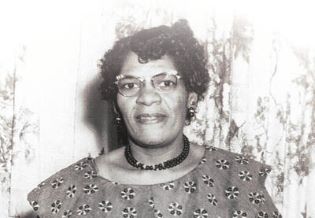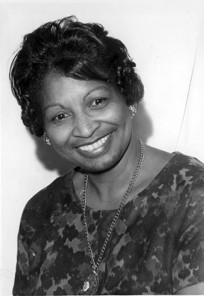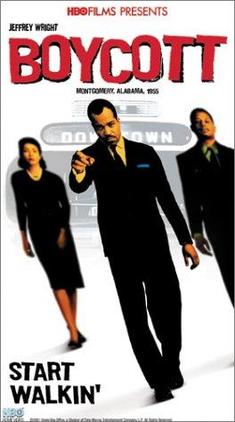Related Research Articles

Martin Luther King Jr. was an American Christian minister, activist, and political philosopher who was one of the most prominent leaders in the civil rights movement from 1955 until his assassination in 1968. A Black church leader and a son of early civil rights activist and minister Martin Luther King Sr., King advanced civil rights for people of color in the United States through the use of nonviolent resistance and nonviolent civil disobedience against Jim Crow laws and other forms of legalized discrimination.

The Montgomery Bus Boycott was a political and social protest campaign against the policy of racial segregation on the public transit system of Montgomery, Alabama. It was a foundational event in the civil rights movement in the United States. The campaign lasted from December 5, 1955—the Monday after Rosa Parks, an African-American woman, was arrested for her refusal to surrender her seat to a white person—to December 20, 1956, when the federal ruling Browder v. Gayle took effect, and led to a United States Supreme Court decision that declared the Alabama and Montgomery laws that segregated buses were unconstitutional.

Ralph David Abernathy Sr. was an American civil rights activist and Baptist minister. He was ordained in the Baptist tradition in 1948. As a leader of the civil rights movement, he was a close friend and mentor of Martin Luther King Jr. He collaborated with King and E. D. Nixon to create the Montgomery Improvement Association, which led to the Montgomery bus boycott and co-created and was an executive board member of the Southern Christian Leadership Conference (SCLC). He became president of the SCLC following the assassination of King in 1968; he led the Poor People's Campaign in Washington, D.C., as well as other marches and demonstrations for disenfranchised Americans. He also served as an advisory committee member of the Congress on Racial Equality (CORE).

The Southern Christian Leadership Conference (SCLC) is an African-American civil rights organization based in Atlanta, Georgia. SCLC is closely associated with its first president, Martin Luther King Jr., who had a large role in the American civil rights movement.

Edgar Daniel Nixon, known as E. D. Nixon, was an American civil rights leader and union organizer in Alabama who played a crucial role in organizing the landmark Montgomery bus boycott there in 1955. The boycott highlighted the issues of segregation in the South, was upheld for more than a year by black residents, and nearly brought the city-owned bus system to bankruptcy. It ended in December 1956, after the United States Supreme Court ruled in the related case, Browder v. Gayle (1956), that the local and state laws were unconstitutional, and ordered the state to end bus segregation.

Donzaleigh Abernathy is an American actress, author and civil rights activist.

Jo Ann Gibson Robinson was an activist during the Civil Rights Movement and educator in Montgomery, Alabama.
The Women's Political Council (WPC), founded in Montgomery, Alabama, was an organization that formed in 1946 that was an early force active in the civil rights movement that was formed to address the racial issues in the city. Members included Mary Fair Burks, Jo Ann Robinson, Maude Ballou, Irene West, Thelma Glass, and Euretta Adair.

Johnnie Rebecca Daniels Carr was a leader in the Civil Rights Movement in the United States from 1955 until her death.

Aurelia Shines Browder Coleman was an African-American civil rights activist in Montgomery, Alabama. In April 1955, almost eight months before the arrest of Rosa Parks in the same city and a month after the arrest of Claudette Colvin, she was arrested for refusing to give up her bus seat to a white rider while she was in the "Whites Only Area". She refused to move to the "Colored Area" thus leading to her arrest.
The Prayer Pilgrimage for Freedom, or Prayer Pilgrimage to Washington, was a 1957 demonstration in Washington, D.C., an early event in the Civil Rights Movement of the 1950s and 1960s. It was the occasion for Martin Luther King Jr.'s Give Us the Ballot speech.
Glenn Smiley was a white civil rights consultant and leader. He closely studied the doctrine of Mahatma Gandhi and became convinced that racism and segregation were most likely to be overcome without the use of violence, and began studying and teaching peaceful tactics. As an employee of the Fellowship of Reconciliation (FOR), he visited Martin Luther King Jr. in Montgomery, Alabama in 1956 during the Montgomery bus boycott where Smiley advised King and his associates on nonviolent tactics, and was able to convince King that nonviolence was a feasible solution to racial tension. Smiley, together with Bayard Rustin and others, helped convince King and his associates that complete nonviolence and nonviolent direct action were the most effective methods and tools to use during protest. After the Civil Rights Movement, Smiley continued to employ nonviolence and worked for several organizations promoting peace in South American countries. Just three years before his 1993 death, Smiley opened the King Center in Los Angeles.
Solomon Snowden Seay, Sr. was an American activist, religious leader, and memoirist.

The First Baptist Church on North Ripley Street in Montgomery, Alabama, is a historic landmark. Founded in downtown Montgomery in 1867 as one of the first black churches in the area, it provided an alternative to the second-class treatment and discrimination African-Americans faced at the other First Baptist Church in the city.

Thelma Glass was an American civil rights activist, noted for helping to organize the Montgomery bus boycott of 1955, and a professor of geography.

Boycott is a 2001 American made-for-television biographical drama film directed by Clark Johnson, and starring Jeffrey Wright as Martin Luther King Jr. The film, based on the book Daybreak of Freedom by Stewart Burns, tells the story of the 1955–1956 Montgomery bus boycott. It won a Peabody Award in 2001 "for refusing to allow history to slip into 'the past.'"

The Holt Street Baptist Church is a historic Baptist church in Montgomery, Alabama, United States.
Joe Azbell was an American journalist and writer. He served as the city editor of the Montgomery Advertiser.

And the Walls Came Tumbling Down is a 1989 autobiography written by civil rights leader Ralph Abernathy. The book charts his life and work with his best friend Dr. Martin Luther King Jr. in their leadership of the Civil Rights Movement to help African Americans obtain equal rights with white Americans. His book engendered much controversy due to Abernathy's allegations of King's infidelity the night before he was assassinated.
Maude Lerita Williams Ballou was an American civil rights activist. She and her husband were personal friends of Martin Luther King Jr. and she worked as King's secretary between 1955 and 1960.
References
- ↑ "Ralph Abernathy: King's Right Hand Man". Legacy.com. 11 March 2011. Retrieved 13 March 2015.
- ↑ Fletcher, Michael (31 August 2013). "Ralph Abernathy's widow says march anniversary overlooks her husband's role". The Washington Post. Retrieved 13 March 2015.
- ↑ King, Martin Luther. [1958] 1965. Stride Toward Freedom: The Montgomery story. [1st] ed. New York: Harper. page 47.
- ↑ Burks, Mary Fair. 1993. "Trailblazers: Women in the Montgomery Bus Boycott." In Women in the Civil Rights Movement: Trailblazers and Torchbearers, 1941-1965, edited by Vicki L. Crawford, Jacqueline Anne Rouse and Barbara Woods, 71-83. Bloomington: Indiana University Press.
- ↑ Gilliam, Thomas J. 1989. "The Montgomery Bus Boycott of 1955-1956." In The Walking City: The Montgomery Bus Boycott, 1955-1956, edited by David J. Garrow, 191-301. Brooklyn, N.Y.: Carlson Pub.
- ↑ Rosa Louise Parks. A Call to Conscience: The Landmark Speeches of Dr. Martin Luther King, Jr. Ed. Clayborne Carson and Kris Shepard. Grand Central Publishing, 2002. p. 2
- ↑ "Smiley, Glenn E." 12 June 2017. Retrieved 4 December 2019.